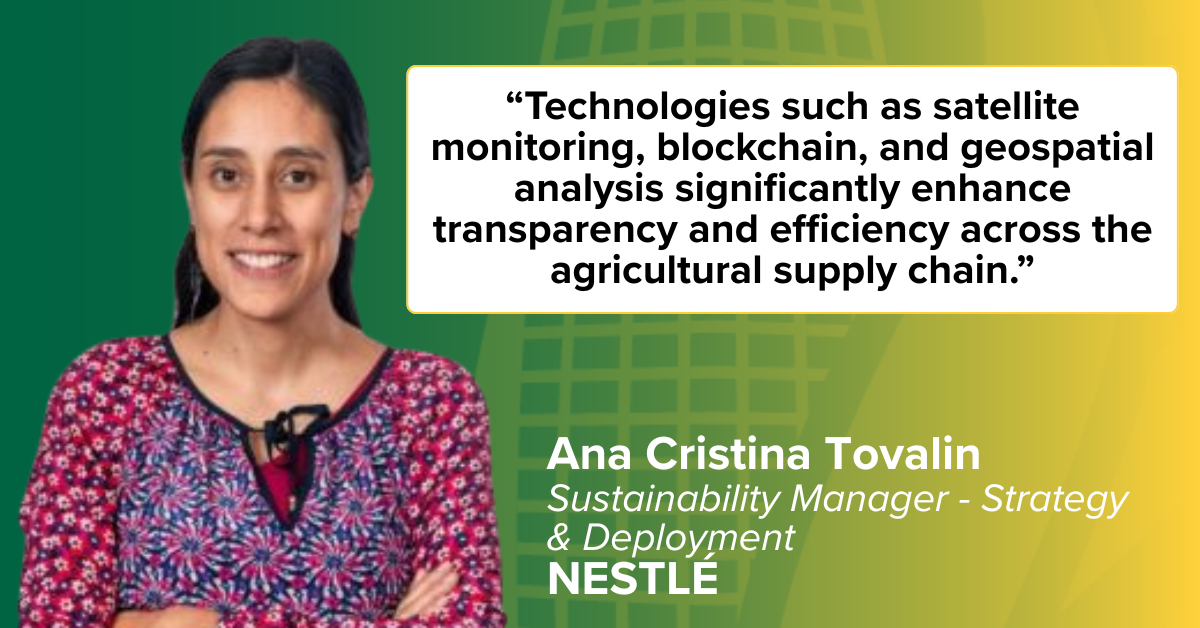Driving Sustainable Coffee Production: Technology, Collaboration, and Certification
As climate pressures, market expectations, and supply chain complexities intensify, the coffee industry is turning to innovation and collaboration to secure a more sustainable future. Technologies such as satellite monitoring, blockchain, and geospatial analysis are transforming transparency, while cooperatives, NGOs, and companies are uniting to empower smallholder farmers with the tools and knowledge they need to thrive.
Ahead of the World Agri-Tech Innovation Summit in Mexico, Ana Cristina Tovalin, Sustainability Manager - Strategy & Deployment at Nestlé, shared insights on how digital solutions, collaboration, and certification programs are driving a more resilient and equitable coffee supply chain.
Technology for transparency and access:
Emerging technologies are reshaping the agricultural landscape, helping farmers gain visibility, efficiency, and access to new financial opportunities.
“Technologies such as satellite monitoring, blockchain, and geospatial analysis significantly enhance transparency and efficiency across the agricultural supply chain,” explains Ana Cristina Tovalin.
- Transparency and trust: Real-time, verifiable data allows stakeholders, from farmers to consumers, to trace products through every stage of the value chain.
- Precision and planning: Geospatial analysis and satellite data help farmers monitor soil conditions, forecast yields, and optimize planting schedules, enabling smarter use of natural resources.
- Operational efficiency: Digital systems reduce manual data collection and management costs, improving overall productivity and profitability.
- Access to finance: With verifiable digital records and traceable production data, farmers can demonstrate reliability to lenders and unlock new financing opportunities.
“These technologies don’t just improve traceability, they empower farmers to become credible participants in financial and commercial ecosystems,” notes Tovalin.

Collaboration across the value chain:
In a complex and fragmented value chain like coffee, collaboration is essential. Cooperatives, NGOs, and companies each play a distinct yet complementary role in driving sustainable transformation.
“Cooperatives are the bridge between sustainable practices and smallholder farmers,” says Tovalin. “They are on the ground, providing education, resources, and ongoing support that enable farmers to transition to sustainable coffee production.”
NGOs, meanwhile, serve as independent validators, ensuring that sustainable practices deliver measurable impact and that farmers receive credible recognition for their efforts. Their expertise helps shape pragmatic solutions that address real-world challenges in the field.
Companies like Nestlé connect this network to the consumer, translating demand for sustainability into real incentives for farmers. Through initiatives like the Nescafé Plan, Nestlé invests in training, technology, and partnerships that improve productivity while rewarding farmers for meeting sustainability standards.
“When all stakeholders, from cooperatives to corporation, align around shared goals, the result is a stronger, fairer, and more transparent coffee sector,” Tovalin emphasizes.
Certification as a pathway to market access:
Sustainability certifications are not just labels; they are entry points into premium markets and long-term resilience.
Farmers access certifications such as 4C through training, partnerships, and financial support provided by programs like the Nescafé Plan. Nestlé works directly with farmers to help them understand certification requirements, navigate auditing processes, and implement sustainable farming practices.
The benefits extend beyond compliance:
- Premium pricing: Certified coffee can command higher prices as consumers increasingly value transparency and sustainability.
- Market access: Certifications open doors to export markets and retail channels focused on ethical sourcing.
- Resilience and productivity: By aligning with certification standards, farmers adopt practices that improve soil health, water efficiency, and long-term yield stability.
“Certification helps farmers not only reach better markets but also build stronger, more sustainable farms,” says Tovalin. “It’s a powerful enabler of both economic and environmental progress.”
Towards a more sustainable coffee future
The future of coffee depends on the balance between innovation, collaboration, and inclusion. Digital technologies are making sustainability measurable; partnerships are making it actionable. Together, they are helping ensure that every cup of coffee supports resilient farmers, transparent value chains, and a thriving planet.
At World Agri-Tech Mexico, Nestlé and other global leaders will explore how technology, traceability, and collaboration can redefine the future of sustainable coffee, from farm to consumer.
)
)
)
)
)
)
)
)
)
)
)